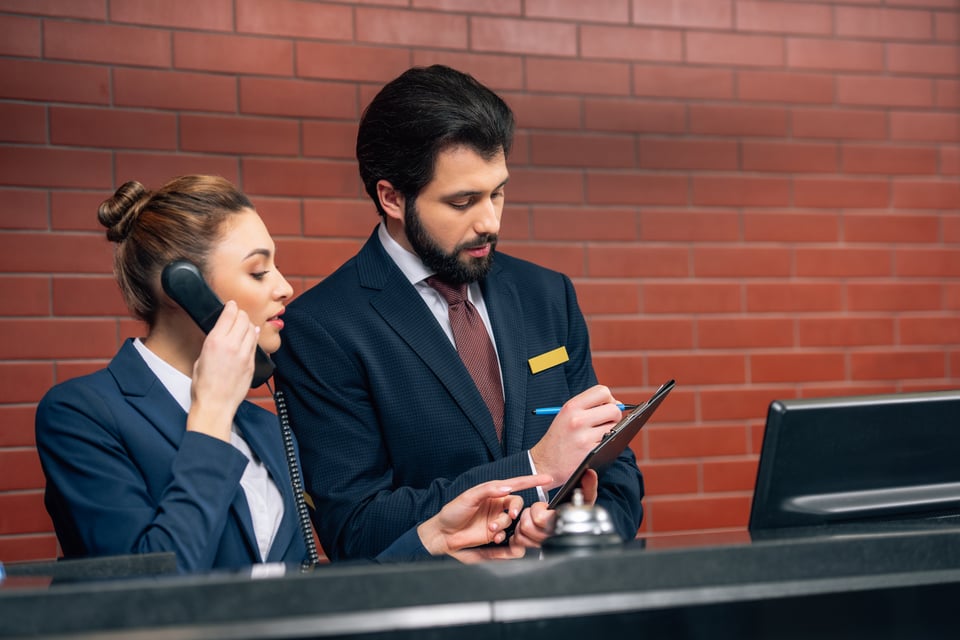Bringing Hotels Into Modernity With Omnichannel Communication Solutions
Modern travelers expect their hotel stays to mirror the tech-enabled experiences they encounter during their daily lives. To stay afloat amid the innovation, hospitality leaders must provide their employees with the technology necessary to support these expectations.
Hotels are complex operations and a variety of departments have a hand in providing the best possible guest experience. Housekeeping, food and beverage, food production, maintenance, marketing and the front office are just a few of the disparate service departments that must work together to ensure a good guest experience.
To modernize effectively, hotels must look to communication solutions that support each employee’s individual duties and processes while keeping them connected to customers throughout each guest’s visit. When considering tech solutions, hospitality leadership should look for communication platforms that enhance the following:
Guest experience
Today’s digital-savvy guest wants a seamless experience across all communication channels throughout the duration of their stay. Seamless task handoffs between employees and contextualized engagement based on earlier interactions are key to these seamless experiences. Seventy percent of customers say connected processes — such as hotels that provide additional pillows every day after the initial request — are very important to winning their business.
Such connected processes are powered by an omnichannel strategy that integrates both digital and traditional communication models. Hotels then have the power to address and streamline each stage of guest engagement, from pre-visit to on-site to post-visit. But this isn’t easy for hotels to accomplish alone.
A streamlined communication platform gives guests the opportunity to ask questions and make service requests through their preferred communication channel, which elevates the guest experience and shortens wait times. It’s important to deploy a solution that can manage all of these channels in a single location and also provide a complete guest profile to hotel employees, no matter when or how the guest contacts the hotel.
Additionally, features like automated outbound communications (via email, text or voice) can collect data on customers after they’ve left. Employees can use this technology to determine the quality of a guest’s stay, thus feeding more data into the customer’s profile and allowing them to improve the guest’s experience moving forward.
Employee efficiency
An omnichannel platform doesn’t just increase guest satisfaction. Opening up lines of communication to staff mobile channels — like SMS, MMS, email and voice — also increases employee satisfaction and streamlines internal operations.
Sending omnichannel reminders and announcements (schedule changes, outages, etc.) to employees over a streamlined platform is much faster and more efficient than using disparate platforms. Alerts go beyond desktop workstations to reach employees on their mobile devices. This allows the front desk to communicate with frontline employees no matter where they are in the hotel. That way, employees aren’t completing tasks without all the necessary resources or simply for no reason. An omnichannel communication platform helps hospitality leadership maintain control and consistency across the entire organization.
Revenue increase
Modern communication platforms also allow hotels to increase reservations and sales by pushing out promotions and discounts to the sources where customers prefer to make transactions. That could be email, voice or social applications. But it could also be via text message, where guests are already communicating on a daily (if not hourly) basis. Guests are more likely to be receptive to offers and promotions that reach them through their preferred channel of communication.
Contextual data on specific customer journeys also empowers marketing departments to better target guests by both location and timing. For example, the front desk could send reminders to guests around check-in and seasonal promotions, and also suggest future travel dates.
Integration is key
In some instances, organizations piece together solutions to solve for all these channels, often leading to a multichannel versus omnichannel approach. Because of this, it’s important that these channels integrate seamlessly.
In a multichannel strategy, employees can interact with customers over several communication channels, each operating in isolation. But an omnichannel approach is a multichannel customer experience strategy that delivers a seamless experience across all channels, providing a single view of the entire customer journey. This approach ultimately simplifies the management of day-to-day customer communications.
Modern travelers expect modern solutions
Accommodating travelers’ needs in a digital world is a significant, but necessary, undertaking for hotels. Modern travel experiences must mimic digital experiences elsewhere, but service and reliability remain top priorities — necessitating technologies that support employee operations. Guests are exposed to many options when booking their next trip, and by anticipating needs, performing tasks quickly and communicating where guests are most comfortable, hotels can become the top choice and preferred stay.
- About the Author
Kara Longo Korte is the Director of Product Management at TetraVX. She is passionate about the role technology plays in communication and collaboration in the workforce and sees Unified Communications as a Service (UCaaS) as the perfect way to connect the everchanging workplace. She has twenty years of experience in the technology industry and has expertise in product management, pre-sales, sales enablement, strategy, CRM and integrations holding various positions with a variety of SaaS organizations.






